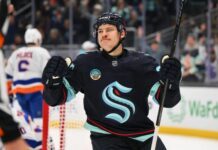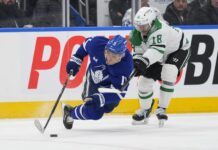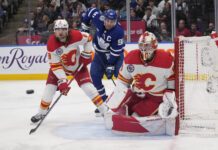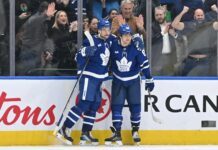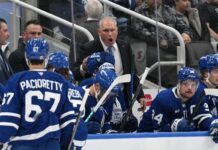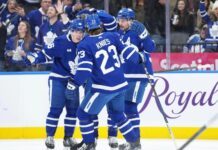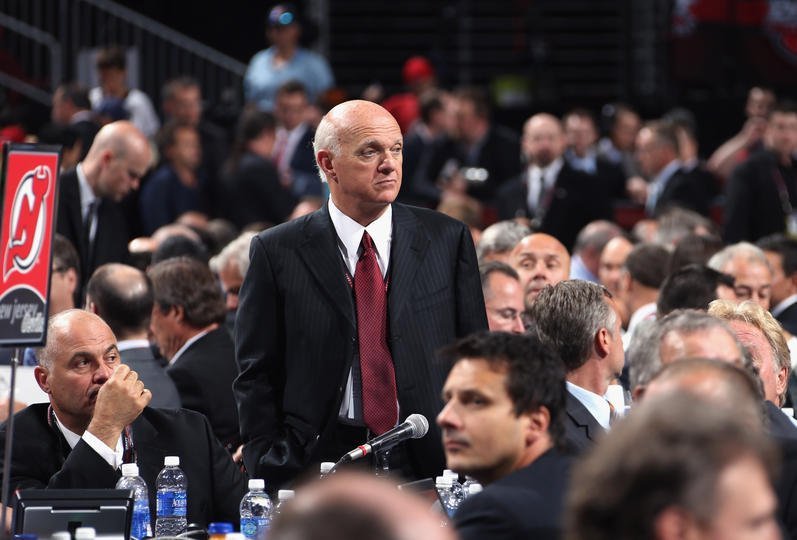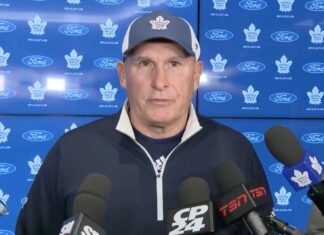Toronto Maple Leafs GM Lou Lamoriello joined TSN Drive to discuss the All-Star Game, the return of William Nylander to the Marlies lineup, trade deadline plans, captain Dion Phaneuf, and Director of Player Personnel Mark Hunter.
A big part of the conversation league-wide has been revolving around why the All-Star game is so important. As a lifer in the NHL, why do you think the All Star Game still holds importance?
Lou Lamoriello: I think it’s just the showplace for all of our star athletes together and it gives an opportunity for the sponsors of the game to come to it. To really bring everyone together, break the season up, and allow the fans to have a little fun and to see that the players are normal and human.
As a GM who has players going year in year out, do you get nervous about whether or not they’ll get injured, or whether or not something will happen to them? What’s your mentality throughout the weekend?
Lamoriello: That has always been the mentality, I think, of every GM and every team executive — whether it’s pulling a groin or there is an accidental situation. But that holds through with the Olympics, that holds through with the World Championships. Any time you get them out of your own environment you’re always concerned.
Speaking of injuries, one of your stars, or stars to be, comes back from injury tonight. William Nylander is coming back, and of course a lot of people are concerned about how he is. We found out today he also had an appendectomy, which was kept pretty quiet. Your comments on that?
Lamoriello: He would’ve been back a lot sooner if it wasn’t for the appendix situation. Fortunately, he’s healthy right now. There is nothing to look forward to other than playing. He’s going to do that tonight. He’ll just play one game this weekend and not take a chance with anything. He hasn’t played for quite a while. He’s in great shape and he’s hungry to go.
I’ve got to say – quite impressed with you guys being able to keep that news quiet in a city like this. I’ve been impressed by the fact that you guys have run the program the way you have. Last year, you weren’t here but you’re well aware it was a circus atmosphere almost from the start. This year it has been very, very quiet – almost boring in a way, which I think was needed. How have you managed to keep things so quiet and keep so many things behind closed doors here in Toronto?
Lamoriello: I don’t think it’s intentional to do anything other than keep our everyday business internal. [We] certainly understand the importance of media and the importance of press, but anything that needs to be said will be said. But there are certain things that we feel very strongly on, that the best way to keep everything going in the right perspective is to be as quiet as you possibly can.
How do you think the media here in Toronto has handled that type of protocol? You would’ve had an impression from before, but now that you’re here, [what are your thoughts] on your interaction with the media in Toronto?
Lamoriello: I really have tremendous respect for the media here in Toronto and always have. I had the opportunity on many occasions to interact with the media through my past in New Jersey and the Cup runs we’ve been involved with, and also just simply being in the game as long as I’ve been, crossing paths many times. I have tremendous respect for the media, and certainly for the city of Toronto and what our obligations are to make the awareness of what is necessary. We will continue to do that but we also feel what should be internal is.
With the deadline right around the corner, if you guys are going to end up moving veteran players out, what is your philosophy in terms of the Marlies coming into play and filling those holes. Where are you at in terms of bringing kids up, in terms of finding other veterans to plug those holes if and when you need them the remainder of this season?
Lamoriello: I have an expression, “when time’s on your side, use it.” I think right now we have time and we’ll handle whatever situation comes about appropriately at that time. To say we’ll do this or do that, I’m just not comfortable doing that because, quite frankly, right now we don’t know.
We’re kind of curious, too – what’s the talk like right now. The last couple of years there hasn’t been as many transactions in the regular season. As the run up gets closer to the trade deadline we start to see more of it. That’s been true in the last little while. What’s the talk like right now? Is there a lot more chatter than there was earlier this year?
Lamoriello: First of all, I think there’s a misconception about more chatter and less chatter, or more conversation and [fewer] conversations. I think it’s the same every year, it’s just that when certain things come about, then it there appears to be more. When one situation happens, then two it seems like… well, it takes one to get it going. I’ve seen so many different things transpire over the years but the one thing that is constant: everybody continues to talk. Normally, as you get closer to the deadline, you talk more and more. There’s no difference, whether you’re involved or just trying to find out what’s going on in the League and make sure you don’t miss anything. You still have to interact and continue to speak and ask questions, or just say hello. “I’m making calls, I know we might not have anything, but is there anything going on?”
At the All Star break now, you’re 48 games into the season, so 48 games with yourself, and Mike Babcock behind the bench. We know that you’ve been friendly and you’ve had a long-standing relationship with Mike, but not necessarily this close up. What have you learned about Mike Babcock that you didn’t know prior to the last 48 games?
Lamoriello: First of all, I’ve known Mike, as you’ve said, and I’ve certainly watched him coach from afar. I’ve also been an opponent in a Stanley Cup situation over a seven-game series when Mike was in Anaheim and I was in New Jersey. I’ve always had a tremendous amount of respect for his ability to get a team prepared for the way they play on a consistent basis. What I did not see, which is what I’ve seen here since I came, was the energy that he provides. He continues to have that day in and day out, from the first time you see him in the morning and the first time the players see him, no matter what transpired the day before — he’s ready to go. He doesn’t allow something that happened in the past get in the way of what he has to be focused on. That’s a skill, that’s a talent, and that’s something I didn’t see to the extent it is. I have tremendous respect for him.
How important is that energy and that passion for the remaining 34 games, with your team in a position in the standings where the playoffs are not really in the picture right now? There may be some trades by the trade deadline. You’re well aware of what happened here the last 30-35 games last season. It was really ugly. It really rattled a lot of fans if not all the fans. How do you keep the players motivated and keep that passion in the final 30-35 games?
Lamoriello: First of all, what happened in the past I have no control over, nor do I really know the ins and outs. All I know is what I’ve experienced here with the players we have and how receptive they’ve been to Mike and his coaching staff. No matter what’s transpired the night before, we’ve come out to play and competed and given the best effort. I do not feel or see that changing. We’re trying to establish something. We’re trying to establish a culture here. We approach every single game 100% no matter what happened yesterday or the day before. [We’re] not thinking of down the road. And that is the approach I think that you will see consistent throughout the remainder of the year.
Mike Babcock has been very complimentary of the captain, Dion Phaneuf. I’ve caught up with Mike multiple times this year and any time I bring up Dion he raves about him. He speaks to what Dion brings in the room. As a GM, how much do you need that leader to perpetuate that message for you? You talk about the culture… where do you draw the line on what the GM can do, what the coach can do and, when it finally gets to the players, what really has to be on the players to actually follow through on that plan?
Lamoriello: I echo what you said your conversations with Mike were. I know I spoke to someone else yesterday in an interview and said the same thing. I’ve been extremely impressed with Dion, how he approaches the game, the professionalism that he brings, how he interacts with all groups of players – when I say groups, that is the younger, the middle age, the older players – and how he cares for them. And also how he will bring up to coaches, to management his thoughts that might be for the good for the team, and understanding if it can or cannot happen. So he has a fan [in me] and the leader that he is right now. I really have tremendous thoughts for him.
For years you had David Conte as your head of scouting with the Devils. Now it’s Mark Hunter here. How did their philosophies differ and how are they the same?
Lamoriello: First of all, they love what they do. They compete against themselves, not against everyone else. They love being in the rink. Both are extremely talented. I am very fortunate to come from David and to have the opportunity to work with Mark, who has just been outstanding. I know the Maple Leafs are extremely fortunate to have a Mark Hunter here. He will get players, he will make decisions, and he will not be afraid to make tough decisions and tough recommendations. I’ve been extremely impressed from day one, and quite frankly I admire Mark Hunter.



